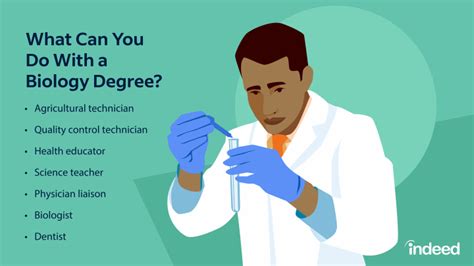With the ever-evolving advancements in biotechnology and healthcare, the demand for individuals with a strong foundation in biology has skyrocketed. A degree in biology equips professionals with the scientific knowledge and analytical skills necessary to navigate diverse fields, ranging from research and academia to healthcare and conservation.

High-Demand Careers in Biology
According to the U.S. Bureau of Labor Statistics (BLS), employment in biological science occupations is projected to grow by 5% from 2019 to 2029, faster than the average for all occupations. Some of the most in-demand careers for graduates with a biology degree include:
-
Biomedical Scientist
-
These professionals conduct research on the causes and treatment of diseases, working in laboratories to develop and test new therapies and treatments.
-
Median Annual Salary: $89,200
-
Medical Technologist
-
They perform laboratory tests on bodily fluids and tissues to aid in the diagnosis, treatment, and prevention of disease.
-
Median Annual Salary: $60,230
-
Environmental Scientist
-
Focuses on the study of the environment and its natural resources, working to protect and manage ecosystems.
-
Median Annual Salary: $76,270
-
Bioinformatics Analyst
-
Combines knowledge of biology and computer science to analyze biological data, contributing to medical research and drug discovery.
-
Median Annual Salary: $98,140
-
Research Scientist
-
Conducts original research in areas such as genetics, microbiology, and ecology, with a focus on advancing scientific knowledge.
- Median Annual Salary: $92,270
Areas of Specialization
A degree in biology provides a versatile foundation for specialization in various subfields, including:
- Molecular Biology: Focuses on the structure, function, and replication of biological molecules, such as DNA and proteins.
- Cell Biology: Studies the structure, function, and behavior of cells, the fundamental units of life.
- Developmental Biology: Investigates the processes involved in the development of organisms from a single cell to a fully formed adult.
- Ecology: Explores the interactions between organisms and their environment, including population dynamics, ecosystem biodiversity, and conservation.
- Evolutionary Biology: Examines the historical development of species and the mechanisms driving biological diversity.
Career Development and Advancement
With experience and additional training, professionals with a biology degree can progress to leadership and management positions in industry, academia, and government agencies. Some potential career paths include:
- Laboratory Manager
- Research Director
- Environmental Consultant
- Biomedical Engineer
- Science Policy Advisor
Common Mistakes to Avoid
To maximize career success in biology, it is crucial to avoid common mistakes such as:
- Underestimating the importance of communication skills. Effective communication is vital for conveying scientific findings, collaborating with colleagues, and educating the public.
- Overspecializing too early. While specialization is essential for expertise, it can be beneficial to gain a broad foundation in biology before narrowing the focus.
- Neglecting professional development. Continuous learning and professional development are crucial for keeping abreast of advancements in the field.
- Overlooking the importance of internships. Internships provide valuable hands-on experience and networking opportunities that can enhance job prospects.
Table 1: Job Outlook for Biology Graduates
| Occupation | Projected Employment Growth (2019-2029) | Median Annual Salary (2021) |
|---|---|---|
| Biomedical Scientist | 4% | $89,200 |
| Medical Technologist | 9% | $60,230 |
| Environmental Scientist | 5% | $76,270 |
| Bioinformatics Analyst | 16% | $98,140 |
| Research Scientist | 1% | $92,270 |
Table 2: Areas of Specialization in Biology
| Subfield | Focus | Applications |
|---|---|---|
| Molecular Biology | Structure and function of biological molecules | Drug discovery, genetic engineering |
| Cell Biology | Structure and behavior of cells | Tissue engineering, cancer research |
| Developmental Biology | Developmental processes | Birth defects, stem cell therapy |
| Ecology | Interactions between organisms and environment | Conservation, climate change mitigation |
| Evolutionary Biology | Historical development of species | Biodiversity, human evolution |
Table 3: Career Development in Biology
| Position | Responsibilities | Skills |
|---|---|---|
| Laboratory Manager | Oversee laboratory operations, manage staff | Project management, safety compliance |
| Research Director | Lead research projects, develop research strategies | Scientific expertise, funding acquisition |
| Environmental Consultant | Advise clients on environmental issues, develop mitigation plans | Expertise in environmental regulations, stakeholder engagement |
| Biomedical Engineer | Design and develop medical devices, research biomedical technologies | Engineering principles, medical knowledge |
| Science Policy Advisor | Inform policymakers on scientific issues, develop science-based policies | Policy analysis, scientific communication |
Table 4: Common Mistakes to Avoid in Biology Careers
| Mistake | Impact | Solution |
|---|---|---|
| Underestimating communication skills | Difficulty conveying research findings, collaborating with colleagues | Develop strong verbal and written communication skills |
| Overspecializing too early | Limited career opportunities, inability to adapt to advancements | Gain a broad foundation in biology before specializing |
| Neglecting professional development | Outdated knowledge, reduced job prospects | Attend conferences, pursue certifications, engage in research |
| Overlooking the importance of internships | Decreased job competitiveness, lack of practical experience | Seek internships in areas of interest, network with professionals |
